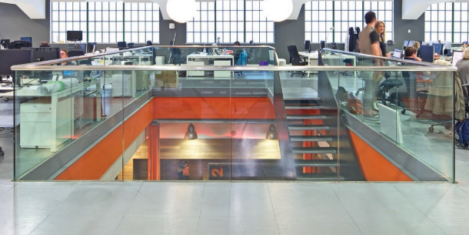July 20, 2021
Search Results for: employees
July 19, 2021
Over two thirds of office workers dread speaking to their IT department
by Jayne Smith • Flexible working, News, Technology, Working lives
 Research by Velocity Smart Technology, investigating how IT departments are coping with a move to remote working, claims that almost half (45 percent) of office workers have had to wait longer for an issue to be resolved whilst working from home – with 73 percent going on to say they have had to wait up to an extra five hours for an issue to be fixed. More →
Research by Velocity Smart Technology, investigating how IT departments are coping with a move to remote working, claims that almost half (45 percent) of office workers have had to wait longer for an issue to be resolved whilst working from home – with 73 percent going on to say they have had to wait up to an extra five hours for an issue to be fixed. More →
July 19, 2021
Employee productivity damaged by notification overload and urgent demands
by Jayne Smith • Flexible working, News, Working lives
 More than two-thirds (68 percent) of employees in the UK have admitted they get so many distractions and message notifications during work that it’s affecting their productivity. This is according to new research from Advanced which also claims 22 percent have so many distractions that their working day is never spent fully on actual work. More →
More than two-thirds (68 percent) of employees in the UK have admitted they get so many distractions and message notifications during work that it’s affecting their productivity. This is according to new research from Advanced which also claims 22 percent have so many distractions that their working day is never spent fully on actual work. More →
July 19, 2021
Thought Machine and LABS agree major deal for new Bloomsbury HQ
by Freddie Steele • Company news, Property
 Thought Machine, core banking technology company, has agreed to lease all 67,000 sq ft, at 7 Herbrand Street, WC1, in a bespoke deal with leading flexible workspace provider LABS. The building will become its new London headquarters to support its ambitious growth plans. More →
Thought Machine, core banking technology company, has agreed to lease all 67,000 sq ft, at 7 Herbrand Street, WC1, in a bespoke deal with leading flexible workspace provider LABS. The building will become its new London headquarters to support its ambitious growth plans. More →
July 16, 2021
Firms who prioritise working culture enjoy better financial performance
by Neil Franklin • News, Wellbeing, Working culture
 Heidrick and Struggles has released the results of a new global CEO study Aligning Culture with the Bottom Line: How Companies Can Accelerate Progress which found that intentionally building a company’s working culture can impact the company’s financial performance in a number of ways. The survey of 500 CEOs across nine countries examines how working culture propels organisational performance in Australia, Brazil, Canada, China, France, Germany, Spain, the UK and the USA. More →
Heidrick and Struggles has released the results of a new global CEO study Aligning Culture with the Bottom Line: How Companies Can Accelerate Progress which found that intentionally building a company’s working culture can impact the company’s financial performance in a number of ways. The survey of 500 CEOs across nine countries examines how working culture propels organisational performance in Australia, Brazil, Canada, China, France, Germany, Spain, the UK and the USA. More →
July 14, 2021
A fifth of staff do not know how their employer supports them in ill-health
by Jayne Smith • News, Wellbeing, Working culture
 A fifth (19 percent) of employees do not know how their employer would support them if they were absent through ill-health or injury, 16 percent think that their employer provides no support and nine percent said they would only receive Statutory Sick Pay of £96.35 per week. This is according to new research from GRiD, the industry body for the group risk protection sector. More →
A fifth (19 percent) of employees do not know how their employer would support them if they were absent through ill-health or injury, 16 percent think that their employer provides no support and nine percent said they would only receive Statutory Sick Pay of £96.35 per week. This is according to new research from GRiD, the industry body for the group risk protection sector. More →
July 14, 2021
Almost all organisations have suffered insider data breaches
by Jayne Smith • News, Technology
 Egress’ Insider Data Breach Survey 2021 claims that 94 percent of organisations have experienced insider data breaches in the last year. Human error was the top cause of serious incidents, according to 84 percent of IT leaders surveyed. More →
Egress’ Insider Data Breach Survey 2021 claims that 94 percent of organisations have experienced insider data breaches in the last year. Human error was the top cause of serious incidents, according to 84 percent of IT leaders surveyed. More →
July 13, 2021
The office is everywhere and nowhere, baby
by Mark Eltringham • Flexible working, Podcasts, Premium Content, Workplace design
 Workplace Insight and IN Magazine publisher Mark Eltringham recently took part in a lively episode of the Nowhere Office podcast with Julia Hobsbawn, Stefan Stern and Joanna Swash. They considered the current nature of work, what long term changes we can expect to emerge now and the role of working culture in providing a great experience for everybody, whoever and wherever they are – and whenever they might work. More →
Workplace Insight and IN Magazine publisher Mark Eltringham recently took part in a lively episode of the Nowhere Office podcast with Julia Hobsbawn, Stefan Stern and Joanna Swash. They considered the current nature of work, what long term changes we can expect to emerge now and the role of working culture in providing a great experience for everybody, whoever and wherever they are – and whenever they might work. More →
July 13, 2021
Purpose, responsible business and diversity key priorities for companies
by Jayne Smith • Business, News, Wellbeing, Working culture
 Organisational purpose, responsible business practices and diversity are growing in importance at Board level and for HR teams, as employers make the connection between good environmental, societal and governance practices and business growth, according to survey findings from the Reward & Employee Benefits Association (REBA) and Mercer Marsh Benefits (MMB). More →
Organisational purpose, responsible business practices and diversity are growing in importance at Board level and for HR teams, as employers make the connection between good environmental, societal and governance practices and business growth, according to survey findings from the Reward & Employee Benefits Association (REBA) and Mercer Marsh Benefits (MMB). More →
July 9, 2021
Yoga is not a wellbeing strategy
by Stephanie Fitzgerald • Comment, Wellbeing
 One of the problems facing businesses right now isn’t the so-called mental health pandemic, it’s that no one seems to know what to do about it. The increased focus on employee mental health and wellbeing has seen progressive leaps in the conversation that were unimaginable 10 years ago. Even the most cynical manager has had to concede that the circumstances of the pandemic have raised the profile and importance of taking care of your employees. The reaction is knee-jerk. Companies want to do something about their employees mental health and wellbeing and they want to do it now. Whatever ‘it’ is. The appetite is there, but they can’t find the menu. More →
One of the problems facing businesses right now isn’t the so-called mental health pandemic, it’s that no one seems to know what to do about it. The increased focus on employee mental health and wellbeing has seen progressive leaps in the conversation that were unimaginable 10 years ago. Even the most cynical manager has had to concede that the circumstances of the pandemic have raised the profile and importance of taking care of your employees. The reaction is knee-jerk. Companies want to do something about their employees mental health and wellbeing and they want to do it now. Whatever ‘it’ is. The appetite is there, but they can’t find the menu. More →
July 8, 2021
Indoor air quality needs to be talked about far more than it is
by Neil Franklin • Comment, Environment, Wellbeing, Workplace design
 One of the unintended consequences of the pandemic has been to focus attention on the issue of indoor air quality. But as Sarah Zhang points out in a recent piece in The Atlantic, this is an issue that we have long understood, and not just as a way to reduce the risks of infection. It is essential for our wellbeing. More →
One of the unintended consequences of the pandemic has been to focus attention on the issue of indoor air quality. But as Sarah Zhang points out in a recent piece in The Atlantic, this is an issue that we have long understood, and not just as a way to reduce the risks of infection. It is essential for our wellbeing. More →





 According to a new survey from
According to a new survey from 



















July 14, 2021
Time to get real on what companies need from their real estate
by Dotan Weiner • Comment, Property, Wellbeing, Workplace design